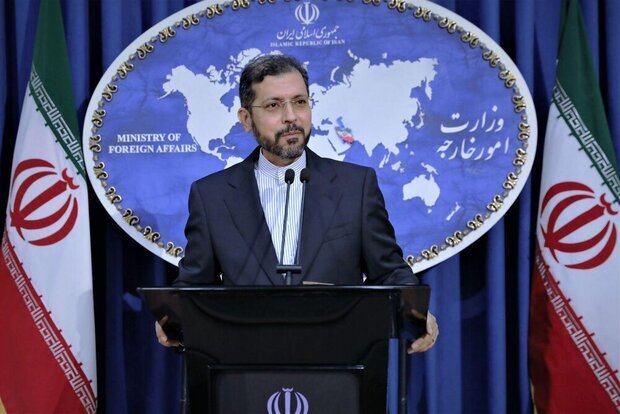No doubt on Russian intention but doubtful of U.S., Iran says of Lavrov’s talks offer

TEHRAN – Foreign Ministry spokesman Saeed Khatibzadeh ruled out the possibility of dialogue with the U.S. following an offer to mediate between the two countries by Russia.
“We have no doubts about the intention of our friends in Russia, but what is doubtful is the U.S. intentions,” Khatibzadeh said at a press conference on Monday.
“The United States has no shame to say that it is seeking [to cause] a nation’s hunger,” he deplored.
In recent remarks at the Moscow State Institute of International Relations, Russian Foreign Minister Sergey Lavrov said Moscow was ready to hold talks with both sides to pave the way for direct talks between Tehran and Washington if both sides were interested.
“We believe that it is better to raise differences and issues directly and receive direct answers,” the Russian foreign minister said.
He also pointed to the U.S.’s attempt to trigger the snapback mechanism under the 2015 Iran nuclear pact to reinstate the UN sanctions on Iran, saying that the attempts are doomed to failure.
Lavrov added that Washington has lost all its rights by withdrawing from the 2015 Iran nuclear deal.
‘Swiss foreign minister’s Iran visit not related to U.S.’
In his Monday remarks, Khatibzadeh also said the visit by Swiss Foreign Minister Ignazio Cassis to Iran has nothing to do with Iran-U.S. relations, ruling out any change in Tehran’s approach toward Washington.
He ruled out any possibility of change in Iran’s stance toward the U.S. as media speculation.
“We are aware of the U.S.’s intentions,” he said, adding that this is while the Swiss government has hosted the financial channel for humanitarian goods with goodwill, honesty and transparency.
Cassis started a three-day tour of Iran starting with a visit to the touristic city of Isfahan on Saturday. He had visited Iran to celebrate centenary of diplomatic ties between Switzerland and Iran. In his talks with top officials in Tehran on Sunday and Monday, the sides discussed bilateral and regional issues.
Switzerland has represented U.S. interests in Iran since 1980 and has acted as a go-between to deescalate tensions between Tehran and Washington. It has also played a key role in paving the way for prisoner swap deals between the two countries.
Cassis’s visit comes amid heightened tensions between Tehran and Washington, with the latter having recently resorted to a political ploy to reimpose the UN sanctions on Iran under the 2015 nuclear agreement it ditched in May 2018.
The U.S. move, which comes under a mechanism commonly known as “snapback”, has been rejected vehemently by other parties to the deal, including Iran on the one side and Russia, China, France, Britain and Germany on the other.
Tehran welcomes legal, professional co-op with IAEA
On Iran’s recent granting of access to International Atomic Energy Agency (IAEA) to two places, Khatibzadeh said the measure was not related to the nuclear deal, officially called the Joint Comprehensive Plan of Action (JCPOA).
The recent access was given under the Comprehensive Safeguards Agreement (CSA), he said. “As long as interactions are done legally and professionally, we will continue our relations with the Agency.”
On August 26, at the end of IAEA chief Rafael Grossi’s visit to Tehran, Iran and the IAEA issued a joint statement on agreements and the results of high-level talks between the two sides.
According to the statement, the IAEA and Iran “agreed to further reinforce their cooperation and enhance mutual trust” to facilitate the full implementation of Iran’s Comprehensive Safeguards Agreement (CSA) and the Additional Protocol (AP) thereto, which is provisionally applied by Iran since January 16, 2016.
“After intensive bilateral consultations, Iran and the IAEA reached an agreement on the resolution of the safeguards implementation issues specified by the IAEA, in good faith. In this regard, Iran is voluntarily providing the IAEA with access to the two locations specified by the IAEA and facilitating the IAEA verification activities to resolve these issues,” the statement said.
Indian foreign minister to meet Zarif on Tuesday
Elsewhere in his remarks, Khatibzadeh said Indian Foreign Minister Subrahmanyam Jaishankar is scheduled to meet his counterpart Mohammad Javad Zarif in Tehran and Tuesday.
“Tomorrow, the Indian foreign minister will have a short visit to Tehran for a few hours on his way to Moscow, and will meet with the Iranian foreign minister,” he said.
He pointed to a recent visit to Tehran by India’s defense minister, saying Tehran and New Delhi have good bilateral defense relations.
“Our relations with India is multilayered and deep,” he said, adding, “One of the aspects of our cooperation is fighting terrorism and providing security in the region.”
The spokesman further said that Iran, as one of the region’s powers, wants to play its role in establishing security in the region.
MH/PA
Leave a Comment